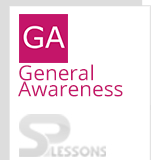 Introduction
Introduction
Polity is a very important subject for Railway Recruitment exams and UPSC Exams. UPSC NDA and NA Prelims Exam is the combination of Mathematics and General Ability. Polity is one of the most important topics in the General Ability section. All these questions are easily understandable format. UPSC NDA and NA Polity Quiz 2 is very useful to get the maximum marks from the General Ability sections. Candidates can check the daily updates at UPSC Official Website
 Pattern
Pattern
| Paper Mode | Subject | Marks | Duration |
|---|---|---|---|
| Paper-I | Mathematics | 200 Marks | 2 hours |
| Paper-II | General Ability | 200 Marks | 2 hours |
 Samples
Samples
1. The Parliament of India can make use of the residua powers
-
A. at all times
B. only during national emergency
C. during national emergency as well as constitutional emergency as well in a state
D. None of the above
-
A. 4 years
B. 5 years
C. 6 years
D. 3 years
-
A. Questions
B. Supplementary questions
C. Adjournment motions
D. None of the above
-
A. 3
B. 4
C. 5
D. 6
-
A. 25 years
B. 21 years
C. 18 years
D. 35 years
6. The pension of a high court judge is charged to the
-
A. Consolidated Fund of India
B. Consolidated Fund of the state where he last served
C. Consolidated Funds of the different states where he has served
D. Contingency Fund of India
-
A. equal fundamental rights to each citizen
B. the right to adequate means of livelihood to each individual
C. just and humane conditions of work to each individual
D. equal wages for equal work to each individual irrespective of sex
-
A. governor on a report by the Supreme Court
B. governor on a resolution passed by Parliament
C. president on a report by the Supreme Court
D. president on a resolution passed by Parliament
-
A. directly elected by the people on the basis of universal adult franchise
B. elected by the members of the state legislative assemblies
C. elected by the members of the state legislative councils
D. elected by the members of the state legislative councils and state legislative assemblies
-
A. during emergency session summoned for the purpose
B. every session
C. first session after each general election and the first session of each year
D. any session
11. The president can expend out of the Contingency Fund of India
-
A. only with the approval of the Parliament
B. without the approval of the Parliament
C. only in the case of the national calamities
D. None of the above
-
A. an effective, hones government
B. socialist government
C. active opposition
D. adequate resources
-
A. Sardar Patel
B. Jawaharlal Nehru
C. K.M. Munshi
D. B.R. Ambedkar
-
A. the Consolidated Fund of India
B. the Contingency Fund
C. both the above funds
D. None of the above
-
A. similar to that of the prime minister
B. identical to that of the president
C. a combination of the position of the prime minister and president
D. not constitutional



